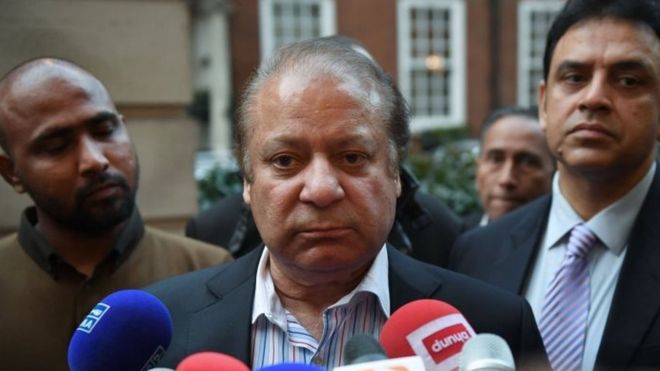A Pakistani court has sentenced former Prime Minister Nawaz Sharif to 10 years in prison on corruption charges related to four luxury London flats.
The National Accountability Bureau (NAB) court handed down the verdict after a series of delays.
His daughter, Maryam Nawaz Sharif, received a seven-year sentence, while his son-in-law, Safdar Awan, was given a one-year sentence.
Nawaz Sharif has said the charges are politically motivated.
Both he and his daughter are in London, where Sharif’s wife, Kulsoom Nawaz, is receiving treatment for cancer.
Judge Mohammad Bashir ordered Sharif to serve 10 years for owning assets beyond income and one year for not co-operating with the NAB. He will serve his sentences concurrently.
Daughter Maryam received seven years for abetting a crime and one year for not co-operating – again to run concurrently – while Safdar Awan’s sentence is for not co-operating.
Sharif and Maryam also received fines of £8m ($10.6m) and £2m respectively.
The case, known as the Avenfield Reference, relates to a number of properties in the UK capital.
The Panama Papers leak in 2015 revealed several of Sharif’s children had links to offshore companies, which were allegedly used to channel funds and buy foreign assets – including luxury flats in Avenfield House, on London’s Park Lane.
His family, however, insist they legitimately acquired the four properties.
As part of the ruling, the court ordered they be confiscated for the federal government.
The UK has no formal extradition treaty with Pakistan, but Section 194 of the Extradition Act 2003 allows special extradition arrangements in exceptional circumstances.
Fearing unrest, the authorities reportedly closed roads around the Federal Judicial Complex in Islamabad and imposed a ban on public assemblies or rallies in the area.
The court repeatedly delayed the decision, initially pushing the ruling back after Friday prayers and then several times again, sparking speculation about the wait.
However, the judge reportedly said part of the delay was because of the need to photocopy the judgement – which is more than 100 pages long – for both the defence and the prosecution.
Source: BBC


